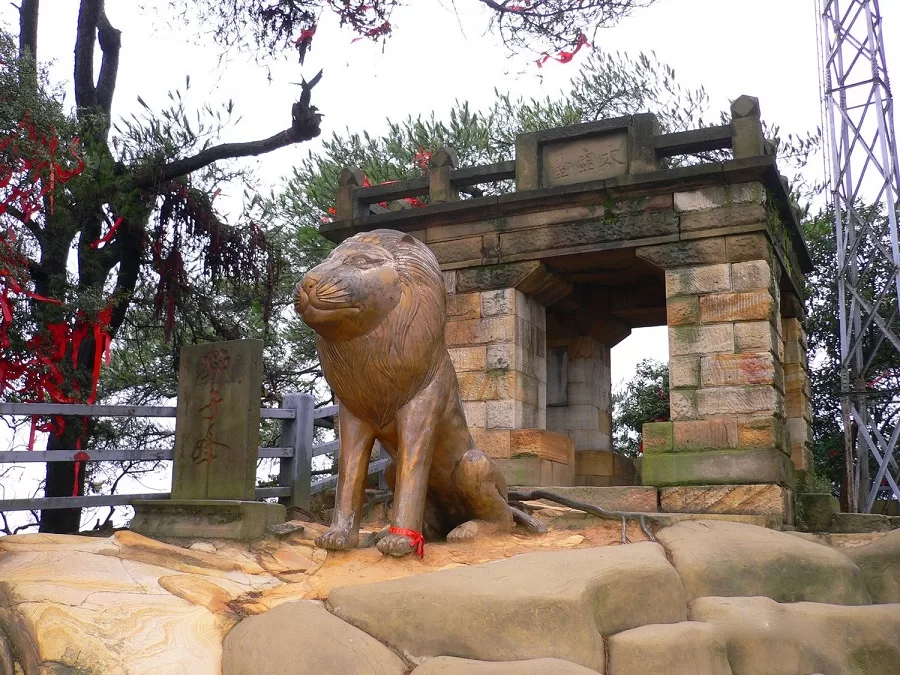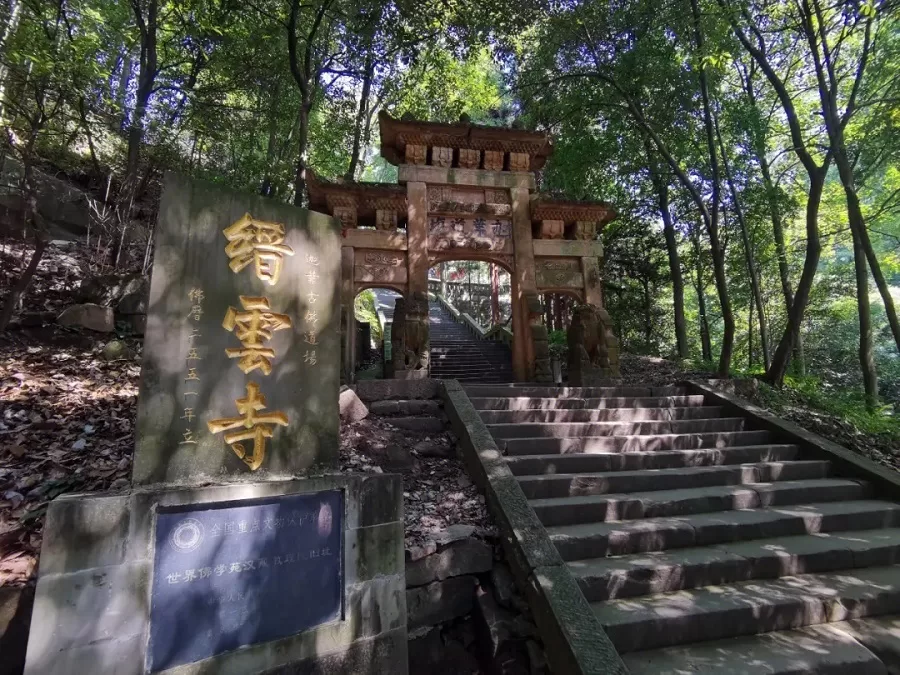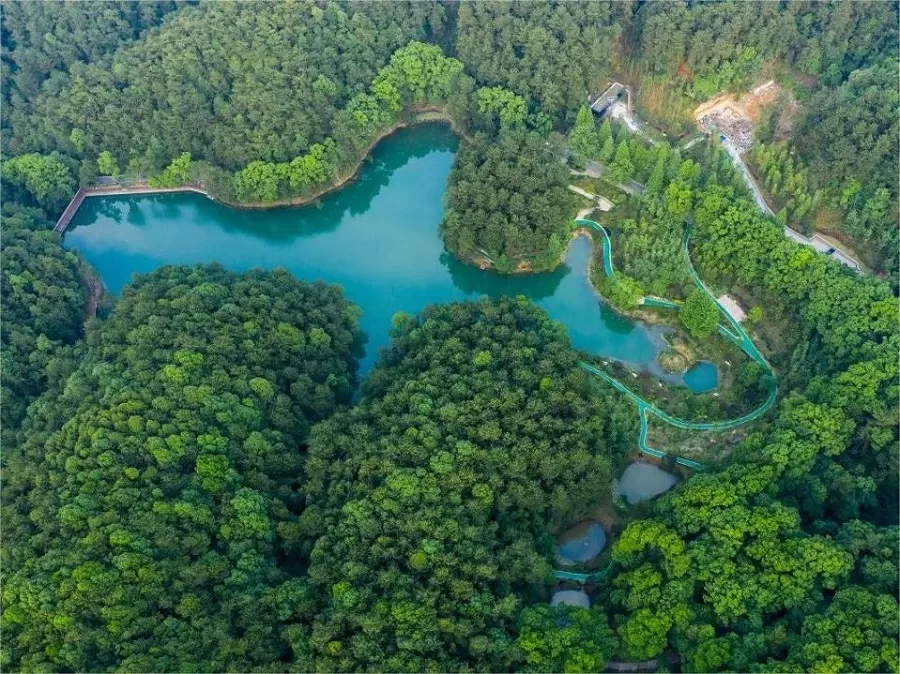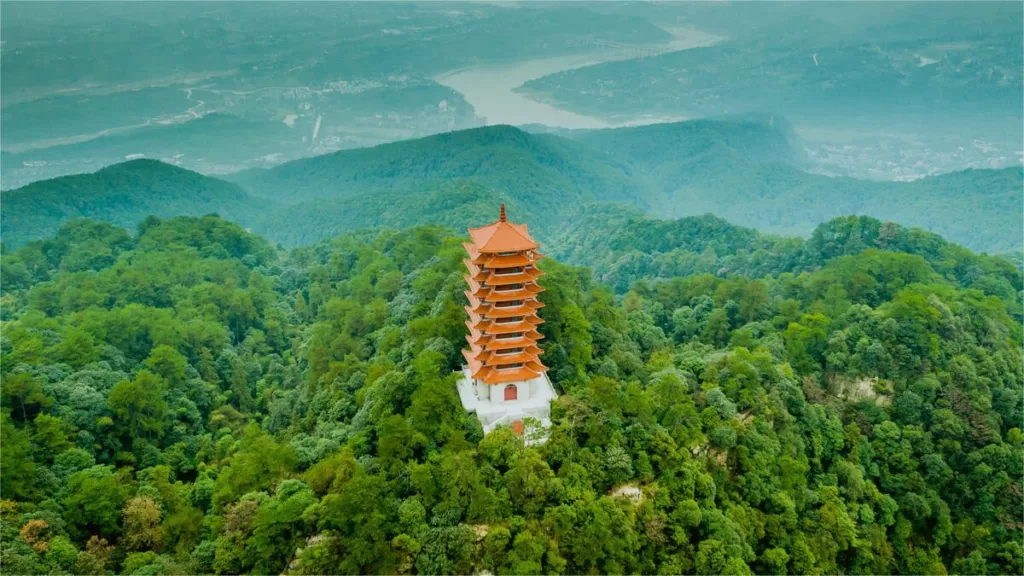Jinyun Mountain in Chongqing (重庆缙云山), located on the banks of the Jialing River in Beibei District, near the new Chongqing Natural History Museum, is a picturesque natural wonder. It is renowned for its breathtaking sunrise views, mesmerizing sea of clouds, and the perfect escape from summer’s heat or a winter wonderland enveloped in mist. The mountain is also a haven for those seeking the beauty of evergreen broadleaf forests.
Jinyun Mountain, previously known as “Ba Mountain,” finds mention in ancient Chinese medical texts such as the “Huangdi Neijing.” Its current name, “Jinyun,” is inspired by the perennial mist and fog that enshroud the area, painting the landscape with hues of red like the dawn. This ethereal beauty, characterized by the interplay of clouds and mist, has earned the mountain its name, as the ancient Chinese believed “more red than white is ‘jin’.” Whether you’re a nature enthusiast, a seeker of serenity, or simply in pursuit of natural marvels, Jinyun Mountain offers an exceptional retreat amidst the wonders of the natural world.
Table of Contents
- Basic Information
- Location and Transportation
- Highlights of Jinyun Mountain
- Vlog about Jinyun Mountain
- Useful Tips Summarized from Reviews
Basic Information
| Estimated Length of Tour | Half a day |
| Ticket Price | 12 RMB |
| Cable Car | Upward: 30 RMB Downward: 20 RMB Round: 40 RMB Operating hours: 9.00 – 16.00 |
| Opening Hours | 9.00 – 17.00 |
| Telephone Number | 0086-023-68224497 0086-023-68347130 |
Location and Transportation
Jinyun Mountain is situated at approximately 106°17′ to 106°24′ east longitude and 29°41′ to 29°52′ north latitude, with elevations ranging from 200 to 952.5 meters. It is located on the western bank of the Wentai Gorge of the Jialing River, within Beibei District of Chongqing, China. The mountain is approximately 35 kilometers away from the city center of Chongqing.
To reach Jinyun Mountain via public transportation, you have several options:
From Chongqing Railway Stations (Chongqing Railway Station or Chongqing North Railway Station):
- After exiting the station, inquire with police officers for directions to the bus station.
- Take a high-speed bus heading to Beibei, and alight at the final destination.
From Chongqing Downtown
- Various areas in Chongqing, including Jiefangbei, Chaotianmen, Nanping, Yangjiaping, and Shapingba, have high-speed buses and public buses heading to Beibei.
- Transfer to Bus 520 at Beibei Station, which will take you directly to the entrance of Jinyun Mountain.
- Alternatively, you can transfer at the underground shopping mall bus station to a tourist special line bus bound for Jinyun Mountain. These buses run from 7:00 AM to 5:30 PM at half-hour intervals.
From the airport:
- Take a direct shuttle bus from the airport to Beibei.
- Take Chongqing Rail Transit Line 3 from the airport to Huixing Station, then transfer to Bus 555 to reach Beibei North Terminal.
- From Beibei Bus Station, take Bus 520 directly to the entrance of Jinyun Mountain, or take a minibus bound for Jinyun Mountain from the exit of Beibei Underground Shopping Mall (last bus at 5:30 PM).
Highlights of Jinyun Mountain
Lion Peak

Lion Peak, situated at an elevation of 864 meters within Jinyun Mountain, Chongqing, is a majestic natural wonder. When gazing upward from below, it resembles a regal lion reclining on the rugged ridge. Crowned by a bronze lion sculpture, it aptly earns its name. Lion Peak offers spectacular night views of the lights in Beibei and captivating sunrise vistas over the mighty Yangtze River. With its panoramic beauty, this peak provides an unparalleled vantage point for beholding both the city’s nocturnal charm and the enchanting break of day over the landscape.
Jinyun Temple and Hot Spring Temple

Jinyun Temple, established in 423 AD, is the only ancient Buddhist monastery dedicated to the revered monk, Jia Ye, in China. It was rebuilt in 1683 under the supervision of Master Pokuong after being destroyed by a fire during the late Ming and early Qing dynasties. The temple is a cultural treasure, known for its rich history and serene surroundings.
Hot Spring Temple, founded in the same year as Jinyun Temple, was initially a subsidiary of Jinyun Temple. This temple boasts splendid architecture, intricate stone carvings, and a vibrant spiritual atmosphere. During the reign of Emperor Shunzong in the Tang Dynasty, the temple was rebuilt, and cliff-side Buddha statues were carved in the mountains behind, adding to its historical significance.
Dai Lake

Dai Lake, located near Jinyun Mountain, is a picturesque gem tucked beneath the Nine Dragon Fortress, just beyond Shao Long Guan. This serene water body boasts crystal-clear emerald waters that resemble the color of the precious gemstone “dai,” inspiring its name. In 1930, the renowned poet Wu Fangji from Baiwu, Jiangjin, bestowed this name upon it.
Dai Lake covers an area of nearly 30 acres and is home to over 140 species of aquatic plants belonging to 20 different genera. It serves as a vital sanctuary for freshwater algae. The lake’s tranquil ambiance makes it an ideal destination for fishing and boating enthusiasts, providing an escape in the heart of nature.
Diverse Fauna and Flora

Jinyun Mountain, designated as a national nature reserve, is a haven for biodiversity. It boasts an impressive array of plant species, including 1,966 species from 992 genera and 246 families. Among them, 51 rare and endangered plant species, such as Ginkgo, Yew, Hemlock, and Suanlou, receive national-level protection. Additionally, the reserve is home to 1,071 animal species, including 13 nationally protected rare species like the Short-eared Owl, Red-crowned Crane, and Eurasian Eagle-Owl. Jinyun Mountain stands as a prominent representative of the subtropical evergreen broadleaf forest ecosystem in the upper reaches of the Yangtze River, serving as a vital genetic repository for regional plant diversity.
Vlog about Jinyun Mountain
Useful Tips Summarized from Reviews
Travel Light: Travelers are advised to pack lightly, bringing only essentials such as a bottle of water. Along the way, there are multiple spots where supplies can be replenished. It’s common to encounter small insects along the route, so bringing insect repellent and wearing long pants is recommended.
Photography Spots: The Lion Peak is highly recommended for photography. From there, visitors can capture stunning views of both the Incense Burner Peak and the entire Beibei District of Chongqing.
The scenery at Dai Lake halfway up the mountain is particularly beautiful on clear days, making it another excellent spot for photography.
Trail Difficulty: The peaks within the scenic area are not particularly difficult to climb, making it suitable for leisurely hiking and fitness activities. Most visitors can complete all the trails in about four hours.

